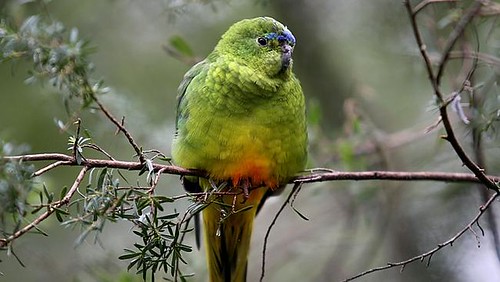 The orange-bellied parrot. Picture: David Geraghty The survival of an Australian parrot on the brink of extinction hinges on the co-operation of scientists who have been engaged in bitter conflict, prompting an extraordinary request for the experts to work together “courteously and respectfully” to save the last 50 orange-bellied parrots in the wild.
The orange-bellied parrot. Picture: David Geraghty The survival of an Australian parrot on the brink of extinction hinges on the co-operation of scientists who have been engaged in bitter conflict, prompting an extraordinary request for the experts to work together “courteously and respectfully” to save the last 50 orange-bellied parrots in the wild.
The deadly beak and feather disease infected 19 of the 26 orange-bellied parrot chicks born in the south of Tasmania last summer, a disaster for the population ahead of its annual flight across Bass Strait to Victoria and South Australia.
Today Environment Minister Greg Hunt will respond to the crisis by announcing a $525,000 rescue package to scale up a captive breeding program for the bird, one of just two migratory parrot species in the world.
At the same time, the Abbott government’s Threatened Species Commissioner Gregory Andrews will hold a workshop of orange-bellied parrot experts, threatened species scientists and representatives from Tasmania’s Environment Department to examine ways to improve the bird’s resilience to the disease and give it the best chance of long-term survival.
The workshop at Melbourne Zoo follows a period of prolonged tension inside and outside the Tasmanian Department of Primary Industries, Parks, Water and Environment over strategies to save the parrot. The Australian has been told scientists who have previously refused to be in the same room have each agreed to attend today’s meeting.
Some familiar with the stoush predict Mr Andrews will need all of the skills he developed in his last job as a diplomat with the Department of Foreign Affairs and Trade for 23 years.
In his invitation to experts on both sides of the conflict, Mr Andrews urged civility for the sake of the parrot at today’s all-day workshop.
“When there is a crisis among people who care passionately, it is easy for emotions or tempers to flare,” Mr Andrews wrote.
“So I want to be very clear that working together collaboratively, courteously and respectfully will be essential at the meeting.
“I ask that everyone comes to the meeting in this spirit ... I know you will agree with me on this and am very confident that the parrot will get the best from us all.”
Testing at Charles Sturt University has found with about 90 per cent certainty that the latest outbreak of beak and feather disease in orange-bellied parrots came from wild parrots with whom they share the forest in southwest Tasmania.
There is now likely to be a robust discussion among scientists about vaccination and the practice of cleaning nesting boxes and feeding tables in the wild.
Mr Hunt said the bird now had the unwanted status of the world’s most endangered parrot, but it was a survivor and the Australian government was not going to give up on the species.